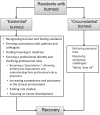"It's Not Just Time Off": A Framework for Understanding Factors Promoting Recovery From Burnout Among Internal Medicine Residents
- PMID: 29467969
- PMCID: PMC5821021
- DOI: 10.4300/JGME-D-17-00440.1
"It's Not Just Time Off": A Framework for Understanding Factors Promoting Recovery From Burnout Among Internal Medicine Residents
Abstract
Background: Burnout rates for internal medicine residents are among the highest of all specialties, yet little is known about how residents recover from burnout.
Objective: We identified factors promoting recovery from burnout and factors that assist with the subsequent avoidance of burnout among internal medicine residents.
Methods: A purposive sample of postgraduate year 2 (PGY-2), PGY-3, and recent graduates who experienced and recovered from burnout during residency participated in semistructured, 60-minute interviews from June to August 2016. Using qualitative methods derived from grounded theory, saturation of themes occurred after 25 interviews. Coding was performed in an iterative fashion and consensus was reached on major themes.
Results: Coding revealed 2 different categories of resident burnout-circumstantial and existential-with differing recovery and avoidance methods. Circumstantial burnout stemmed from self-limited circumstances and environmental triggers. Recovery from, and subsequent avoidance of, circumstantial burnout arose from (1) resolving workplace challenges; (2) nurturing personal lives; and (3) taking time off. In contrast, existential burnout stemmed from a loss of meaning in medicine and an uncertain professional role. These themes were identified around recovery: (1) recognizing burnout and feeling validated; (2) connecting with patients and colleagues; (3) finding meaning in medicine; and (4) redefining a professional identity and role.
Conclusions: Our study suggests that residents experience different types of burnout and have variable methods by which they recover from and avoid further burnout. Categorizing residents' burnout into circumstantial versus existential experiences may serve as a helpful framework for formulating interventions.
Conflict of interest statement
Conflict of interest: The authors declare they have no competing interests.
Figures
Comment in
-
Wellness Opportunities: Sometimes It Is "Just Time Off".J Grad Med Educ. 2018 Jun;10(3):361. doi: 10.4300/JGME-D-18-00260.1. J Grad Med Educ. 2018. PMID: 29946409 Free PMC article. No abstract available.
References
-
- Maslach C, Jackson SE. . The measurement of experienced burnout. J Occup Behav. 1981; 2 2: 99– 113.
-
- Dyrbye LN, West CP, Satele D, et al. . Burnout among US medical students, residents, and early career physicians relative to the general US population. Acad Med. 2014; 89 3: 443– 451. - PubMed
-
- Schwenk TL. . Resident depression: the tip of a graduate medical education iceberg. JAMA. 2015; 314 22: 2357– 2358. - PubMed
-
- Lefebvre DC. . Perspective: resident physician wellness: a new hope. Acad Med. 2012; 87 5: 598– 602. - PubMed
-
- Shanafelt TD, Bradley KA, Wipf JE, et al. . Burnout and self-reported patient care in an internal medicine residency program. Ann Intern Med. 2002; 136 5: 358– 367. - PubMed
MeSH terms
LinkOut - more resources
Full Text Sources
Other Literature Sources
Medical
Molecular Biology Databases

